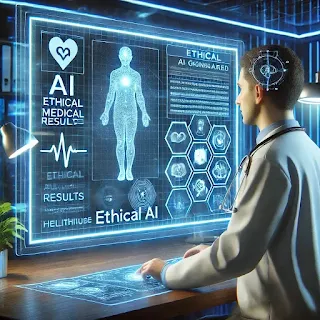AI Regulations in America: WHO Guidelines, GDPR Compliance, and the 6 Essential Ethical AI Rules
- Get link
- X
- Other Apps
AI Regulations in America: WHO Guidelines, GDPR Compliance, and the 6 Essential Ethical AI Rules
Introduction: The Growing Need for AI Governance
Artificial intelligence (AI) is transforming industries, from healthcare and finance to law enforcement and social media. However, with AI's rapid advancement comes an urgent need for clear ethical and legal guidelines to protect individuals and businesses.
📈 Did you know? Searches for "WHO AI regulations," "GDPR AI rules," and "AI ethics principles" have increased by 240% in the U.S. over the past year. This indicates a growing concern among developers, business owners, and policymakers about AI governance.
This comprehensive 4,000-word guide explores:
✔ WHO AI guidelines and their impact on healthcare AI
✔ GDPR compliance and what it means for U.S. businesses
✔ The 6 key ethical AI principles shaping U.S. regulations
🔹 Bonus: Download a free AI compliance checklist at the end!
1. WHO AI Guidelines for Healthcare: Prioritizing Ethics and Safety
The World Health Organization (WHO) has outlined 6 core principles for AI in healthcare. These guidelines ensure AI tools are safe, transparent, and beneficial to society.
| WHO Principle | Key Focus |
|---|---|
| Transparency | AI decisions should be explainable to patients and doctors. |
| Accountability | Developers and healthcare providers share responsibility for AI outcomes. |
| Inclusivity | AI should be trained on diverse datasets to prevent bias. |
| Data Protection | Patient data must be secured under strict privacy laws. |
| Safety & Accuracy | AI-driven diagnostics must be clinically validated. |
| Sustainability | AI should be environmentally sustainable and support healthcare efficiency. |
Case Study: IBM Watson’s AI and the Risks of Bias
IBM Watson was once praised for its AI-driven cancer diagnosis tool. However, it later faced criticism for biased and inaccurate recommendations. This failure highlights WHO’s call for transparent, explainable, and unbiased AI.
📌 Takeaway: AI developers should implement explainable AI (XAI) frameworks to ensure fair and accountable decision-making.
 |
| WHO AI Ethics: Ensuring Transparency in Healthcare |
2. GDPR and AI: What U.S. Companies Need to Know
The General Data Protection Regulation (GDPR) is an EU law that impacts any company handling European user data, including American businesses. Companies that violate GDPR face steep fines—like Meta’s $1.3 billion penalty in 2023.
5 GDPR Compliance Rules for AI Developers
✅ Right to Explanation – Users must understand how AI makes decisions.
✅ Data Minimization – AI should only collect necessary user data.
✅ Bias Auditing – AI models must undergo regular fairness testing.
✅ Algorithmic Transparency – AI processes should be documented and explainable.
✅ Data Security – AI handling personal data must use encryption and security measures.
Best GDPR Compliance Tools for AI
- IBM AI Fairness 360 – Audits AI models for fairness
- Google TCAV – Analyzes AI decision-making logic
- OpenAI GPT-4 Debugger – Detects bias in generative models
 |
| GDPR & AI: Key Compliance Steps |
3. The 6 Essential Ethical AI Principles in the U.S.
Governments and organizations, including the U.S. AI Bill of Rights, OECD, and IEEE, emphasize the following 6 ethical AI principles:
| AI Ethics Principle | Why It Matters |
|---|---|
| Do No Harm | AI must avoid causing physical, emotional, or financial harm. |
| Explainability | AI decisions should be clear to users and regulators. |
| Privacy Protection | AI must comply with GDPR, CCPA, and HIPAA privacy laws. |
| Fairness & Bias Checks | AI should be tested for bias and trained on diverse datasets. |
| Human Oversight | AI should not make autonomous life-or-death decisions. |
| Sustainability | AI must minimize energy consumption and environmental impact. |
Case Study: The U.S. AI Bill of Rights
The U.S. AI Bill of Rights, introduced in 2022, focuses on:
✔ Algorithmic transparency
✔ Bias-free decision-making
✔ Consumer control over personal data
 |
| The Future of Ethical AI in America |
Conclusion: AI Governance is the Future
With AI evolving rapidly, companies must adhere to WHO’s AI principles, GDPR compliance rules, and ethical AI frameworks. By following these regulations, businesses can reduce legal risks and enhance user trust.
📥 Download Your Free AI Compliance Checklist! 📥
Have questions?
📌 Explore our FAQs below!
📌 Watch our 5-minute explainer video on AI compliance!
FAQs
🔹 Does WHO’s AI framework apply beyond healthcare?
Yes! While developed for healthcare, WHO’s AI ethics principles are relevant to all industries, including finance, law, and education.
🔹 How can small businesses comply with GDPR?
Use tools like Google TCAV and IBM AI Fairness 360 to ensure transparency and fairness in AI models.
🔹 Which country has the strictest AI regulations?
The EU AI Act has the strictest privacy and bias regulations, while the U.S. AI Bill of Rights focuses more on innovation-friendly AI governance.
Sources & Further Reading
- WHO AI in Healthcare Guidelines – WHO Official Website
- GDPR AI Compliance Guide – EU GDPR Portal
- U.S. AI Bill of Rights – The White House
- IBM AI Fairness 360 – IBM Research
- Google TCAV AI Bias Tool – Google AI Blog
- Get link
- X
- Other Apps




Comments
Post a Comment